-

人教版新目标初中英语九年级下册Could you please tell me where the restrooms are教案
Step Ⅰ RevisionCheck homework. Ask a few students to read the article in 3a.Then ask a few students to read their guides.Step Ⅱ Part 1Look at the words in the box. Ask a student to read them. Make sure the students understand the meaning of the words. You are to fill in the blanks with the words. In some cases, students may need to use another form of the word, for example adjusting for tense or subject/ verb agreement.Ask students to fill in the blanks on their own.Check the answers. Step ⅢPart 2Go through the instructions with the class.Look at the example with the students.Ask students what the answer would be.Ask a student to read the question and answer it.Excuse me, could you tell me where the bank is, please?The bank is across the street from the shopping malt.Get students to complete the work in pairs.Check the answers. Ask a few students to read their questions.Step Ⅳ Just for Fun!Ask all the students to read the conversation. Ask: What is funny about this cartoon? Help students to explain. A Martian is a person from the planet Mars.There is no such thing as Martian food on Earth, and the clerk looks silly because he is trying to think of where there is a Martian restaurant.Invite some pairs of students to present this conversation to the rest of the class.Step Ⅴ Summary and HomeworkIn this class, we’ve done much writing practice using the key vocabulary words and the target language presented in this unit. After class, please finish the questions in 2 in your exercise books. Then finish the exercises on pages 47~48 of the workbook as well.The Seventh Period Ⅰ Teaching Aims and Demands1. Knowledge Objects(1) Key Vocabularyimage, adventure, jealousy, hero, crime, journey, brave, no longer, show interest in, take it easy, become interested in, plain looks(2)Text:Grown-ups like cartoons, too.2. Ability Objects(1) Fast-reading to get a general idea of the text.(2) Careful-reading to get the detailed information in the text.

人教版新目标初中英语九年级下册I’ll help clean up the city parks教案
Talk about offering help (P60)I’ll help clean up the city parks.A: I’d like to work ...B: You could help ...Talk about ways to tell people about the Clean-Up Day (P61)We need to ...We can’t ...I’ll ...Talk about the work the volunteers do (P62)These three students all volunteer their time to help other people.Somebody loves to ... / helps ... / plans to ... / wants to ...A: What do you like doing?B: I like ... A: What kind of volunteer work do you think I could do?B: You could ...1. 重点词汇advertisement, fix, repair, pleasure, blind, deaf, shut, carry, specially, fetch2. 认读词汇hunger, homeless, cheer, clean-up, sign, establish, major, commitment, elementary, veterinarian, coach, similar, call-in, strategy, disabled, organization, unable, support, appreciate, donation, part of speech, pronoun, adverb, preposition, conjunction, donate, Jimmy, Sally3. 词组clean up, cheer up, give out, put off, set up, think up, take after, fix up, give away, put up, hand out, work out, at once

人教版新目标初中英语九年级下册We’re trying to save the manatees教案2篇
本单元主要围绕着有关濒临灭绝的动物这一话题,学习了应该怎样保护我们的环境,以及就某一问题展开辩论。目标提示语言目标能够运用所学知识,就某一问题展开辩论。认知目标1、复习一些语法:现在进行时、一般现在时、用used to 表示一般过去时、现在完成时、一般过去时的被动语态。2、学会表达同意和不同意。3、学会以下基本句型:We’re trying to save the manatees.Manatees eat about 100 pounds of food a day.There used to be a lot of manatees.In 1972,it was discovered that they were endangered.Some of the swamps have become polluted.情感目标了解一些濒临灭绝的动物的生活习性和濒临灭绝的原因,教育学生应该如何保护环境。教学提示充分利用多媒体等教学设备,创设与本课话题相关的情境,如各种不同种类的动物、动物园以及有关环境的画画等等。围绕着本单元的教学目标,设计一些贴近学生实际的教学任务,如让学生谈论自己最喜欢的动物,如何拯救濒危动物,如何保护环境等等。让学生根据所学知识,就动物园是否对动物有利以及其他的话题进行辩论。

人教版新目标初中英语九年级下册You’re supposed to shake hands教案
教学目标:1. 掌握本单元一些重点词汇的写法和用法。2. 学会自如谈论餐桌礼仪。Step 1 RevisionAsk some students to retell the customs at the table in France in the passage in 3a.Step 2 Self checkPart 1. Fill in each bland with the correct word given. Students do the exercises by themselves at first. Then check the answers. Ask the students to comprehend the sentences and help them point out uses of some words, like “arrive (at / in) sw., spend time / money on sth , spend time / money (in) doing sth.”Part 2. Read about Fan Ling’s experience in a western restaurant. Understand the passage. Point out some key points in the passage.1. be / get used to doing sth. 习惯做某事2. begin with = start with 以….开头3. crowd v. 挤满,塞满 the crowd 人群 crowded adj. 拥挤的Then students discuss about how she would solve her problem. Ask some to share their stories with others.Part 3. Complete the crossword by looking at the sentences on the left. Then check the answers.
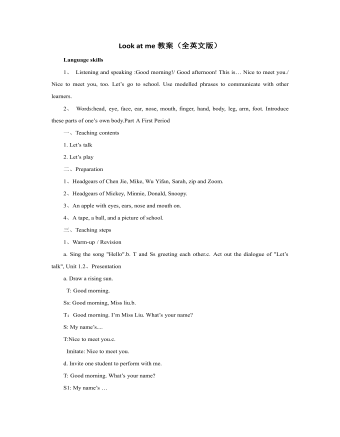
人教版新课标PEP小学英语三年级上册Look at me教案(全英文版)
3、Practicea. Nice to meet you. Nice to meet you,too.b. Perform the dialogue.c. Arrange the dialogue according to the pictures or sentence cards.d. Let’s play.A: Good afternoon,B. This is C. Hello, C! Nice to meet you.C: Nice to meet you, too.A,B: Goodbye!C: Bye!4、Assessment Workbook page 10Add-activitiesa. Listen to the recording and repeat.b. Make a dialogue according to "Let’s talk".Second Period一、Teaching contents1. Let’s learn Words:body, leg, arm, hand, finger, foot.1. Let’s do二、Preparation1、a puppet2、Cards of body, leg, arm, hand, finger and foot.3、headgear of a captain三、Teaching steps1、Warm-up/ Revisiona. Captain says to review "let’s do" of Part A.b. Perform the students their own dialogues.2、Presentationa. Learn to say "body, leg, arm, hand, finger and foot."b. Listen to the recording and repeat.c. Let’s do. Clap your hands. Snap your fingers. Wave your arms. Cross your legs. Shake your body. Stamp your foot.3、Practicea. Let’s draw a person.b. Let’s do. Point out which picture.c. Let’s do. Who responses faster.4、Assessment Workbook page 115、Add-activitiesa. Listen to the recording, repeat and act out.b. Say all the names of the body to your parents.Third Period一、Teaching contents1. Let’s check2. Let’s chant二、Preparation1、stationeries1、pictures of parts of Zoom
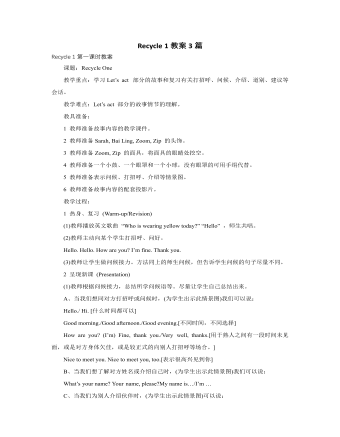
人教版新课标PEP小学英语三年级上册Recycle 1教案3篇
4 课堂评价 (Assessment) (1)做活动手册本单元第3、4、5 部分的练习。练习3是检测学生的词汇掌握情况。教师可以让学生组成两人组进行看词快说的比赛,说对一个词涂一朵小花,比谁的花多。练习4是让学生看词涂色,说说两种颜色的结合会变成什么颜色,并将第3种颜色涂在圈中。教师可以给学生做一个示范,然后再让学生动手实践。此练习是机动性练习,教师可根据时间分配情况灵活安排。练习5 是让学生将句子和相对应的图连线,教师可以先让学生看图,猜图上人说的话,然后再连线。此练习是检测学生对句子的整体认读能力,不需要学生认识句子中的每个单词。练习后,根据学生情况进行简单小结。给学生适当的奖励。(2)让学生自我评价半学期的英语学习情况,可在第37页上做标记,看看自己能达到什么程度。对于评价结果不太理想的学生,教师要及时鼓励,教育学生不能灰心放弃,针对这部分学生具体的情况在课后进行进一步交流。
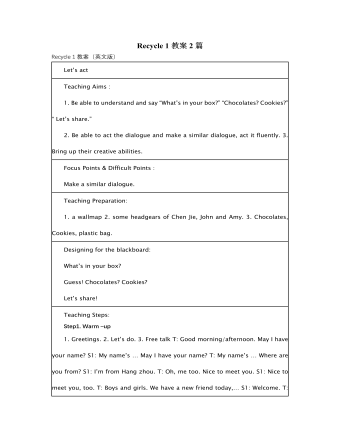
人教版新课标PEP小学英语三年级下册Recycle 1教案2篇
1.猜袋中东西数 将全班分成若干小组,每组抽一人到前面,背对着班级。教师拿一个袋子,并向学生们借一些书本,铅笔,钢笔,橡皮等,放入袋中,然后让各组学生轮流猜袋子里东西的数目,猜对的给该组记10分。 2.学生一起有节奏地说唱Let’s chant部分的歌谣,并请学生分角色表演。 (二)呈现新课 (Presentation) 1.抢读单词 教师将全班分成若干小组,然后逐个出示一些图片,学生们举手抢答,教师让最先举手的学生将图片的单词说出来,说对的给该组记10分,得分最多的组为优胜。 2.看单词卡读出单词并说出中文,复习1-3单元要求四会的单词。 3.教师用实物投影出示1-3单元课文中的某一幅图片,让学生根据图片内容进行对话练习。 4.让学生填写Assessment部分的内容,自己对1-3单元所学内容的掌握情况进行自我评价。 5.教师向学生出示已制作好的window card:This si a window card.并教读window card教师问学生:Do you like it? Can you make it? Do you want to learn how to make a window card?
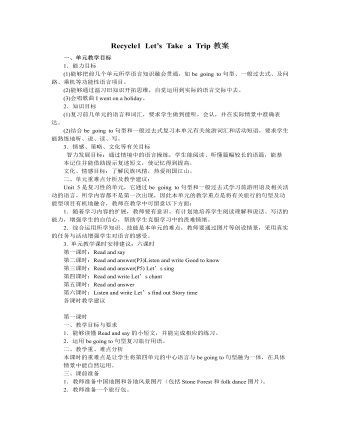
人教版新课标PEP小学英语六年级下册Recycle1 Let’s Take a Trip教案
4.巩固和扩展(Consolidation and extension) (1) 做本单元活动手册配套练习。 (2) 翻卡片说单词。学生两人一组,把单词卡片反面朝上放在桌子上,然后同时翻开两张单词卡(如:going, holiday),就马上组织成一句话(如:Where are you going on the holiday?/ I’m going to Kunming this holiday.),说得快又正确者为胜。 (3) 教师播放C部分Story time的录音或VCD,帮助学生理解故事内容。学生再听一遍录音,跟读故事里的句子,教师指导学生发音。 (4) Bright eyes. 在黑板上张贴Let’s find out的8幅图片,Mike, Zhang Peng, Sarah, Kathy等4个人物图片分别放在8幅图片上,如:Mike ---take pictures---buy presents。学生仔细观察后,请学生闭上眼睛,教师就趁学生闭眼之际交换人物位置(如把Mike放到eat noodles),然后请学生张开眼睛回答:What did Mike do just now ? 引导学生回答: Mike took pictures and bought presents. 教学参考资料库 1.文化背景介绍: 机场标志: Airport 飞机场 Airport lounges 机场休息室Airports shuttle 机场班车 Arrivals 进港Assistance 问讯处Check in area (zone) 办理登机区Departure airport 离港时间Departure times on reverse 返航时间 Welcome aboard 欢迎登机
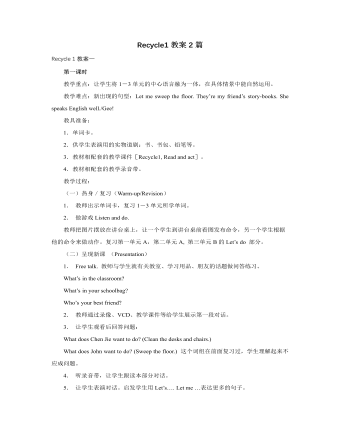
人教版新课标PEP小学英语四年级上册Recycle1教案2篇
Part two1. Teaching AimsMaster the 26 letters.Master the pronunciation of the letters.2. Teaching Aidsa tape-recorder, some cards, some papers and so on.3. Important pointsThe pronunciation of the letters4. Teaching steps1) Greetings and revisionLet some groups act out the dialogue in the last lesson.2) New contentsLet them say out the 26 letters and let some ones say them out.Then listen and learn the letters song.First, give them some minutes and let them read the letters. Let’s see whether there is anyone who can learn anything in them. Then give them some information and let them read again. At last, give them the answer and read again.Let them remember it.PracticeShow the cards where are written the math patterns and let some answer it. Then ask “Who can read it in English?” Let some one read it. Others follow him.Next, show the cards and ask others answer them. T asks and S answers. Then S asks and S answers. Practice in pairs.HomeworkMaster the letters.Teaching notesPart three1. Teaching AimsIntroduce self and others using the words and phrases.Let’s play.2. Teaching Aidsa tape-recorder, some cards3. Important pointsShe has…She likes…I have…4. Teaching stepsGreetings and revisionLet some one read the letters and divide them by the pronunciations.
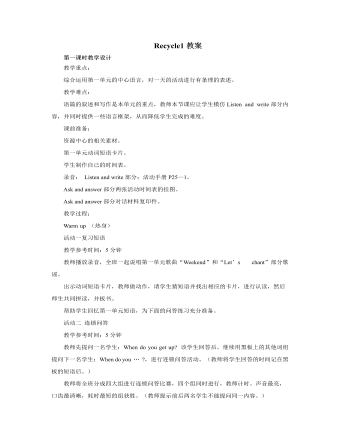
人教版新课标PEP小学英语五年级下册Recycle1教案(内容详细)
学生搜集中外重要节日及部分中外名人的生日所在的月份。教师准备相关节日及部分中外名人的图片或音像资料片。教师课前准备Let’s find out2的配图画好春、夏、秋、冬四个方框。录音:Listen and number。教学过程:Warm up (热身)活动一复习单词教学参考时间:3分钟(1)教师播放Let’s chant部分的歌谣,学生听一遍后跟唱。(2)出示带有各个月份特征的单词卡片。学生看图说出单词,并一起拼读其缩写形式。帮助学生在有节奏的说唱中巩固记忆单词,为在后面活动中学生能够熟练应用作铺垫。活动二 复习句子教学参考时间:5分钟(1)师生同唱Let’s chant部分歌谣“When Is Your Birthday?”。(2)教师引导学生看歌谣下面的翻滚过山车的动画,师生进行问答,如:When is the rabbit’s birthday? It’s in May. 等。教师示范后请学生进行Pair work,也可以展开竞赛的形式进行“连锁问答”。巩固有关生日问答的语句,为Let’s find out1的活动做准备。
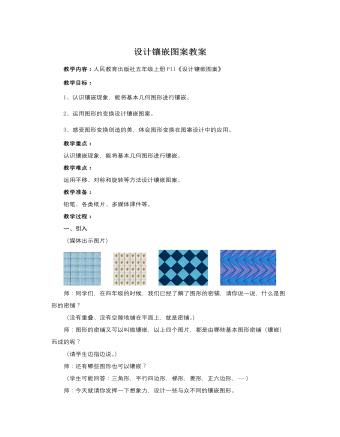
人教版新课标小学数学五年级下册设计镶嵌图案教案
师:同学们,在四年级的时候,我们已经了解了图形的密铺,请你说一说,什么是图形的密铺?(没有重叠、没有空隙地铺在平面上,就是密铺。)师:图形的密铺又可以叫做镶嵌,以上四个图片,都是由哪些基本图形密铺(镶嵌)而成的呢?(请学生边指边说。)师:还有哪些图形也可以镶嵌?(学生可能回答:三角形,平行四边形,梯形,菱形,正六边形,……)师:今天就请你发挥一下想象力,设计一些与众不同的镶嵌图形。[设计意图说明:学生在四年级已经初步了解了图形的密铺(镶嵌)现象,四幅图片是四年级下册教材《三角形》单元中《密铺》内容中的原图。本单元在此基础上,通过数学游戏拓展镶嵌图形的范围,让学生用图形变换设计镶嵌图案,进一步感受图形变换带来的美感以及在生活中的应用。]二、新授探究一:利用平移变换设计镶嵌图形
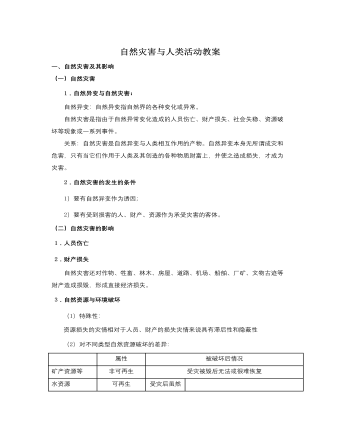
人教版高中地理选修5自然灾害与人类活动教案
(1)类型:常见的农作物病害有:稻瘟病、小麦锈病、棉花枯萎病、烟草炭疽病等。常见的森林病害有:杨树烂皮病、松疱锈病、溶叶病、泡桐丛枝病等。(2)病害发生的原因:A.气候变异等造成的不良环境使得作物对病害抗性降低。B.外来病原体入侵也是病害流行的主要原因。(3)危害:病害使农作物、树木染病从而枯萎甚至死株,导致大面积农田、森林被毁坏。2.虫害和鼠害(1)虫害的常见类型①常见的农作物虫害有:蝗虫、黏虫、水稻螟、棉铃虫等。其中危害最大的是蝗虫。②常见的森林虫害有松材线虫、松毛虫、杨树蛀干害虫、泡桐大袋蛾等。其中松材线虫是世界上最具危险性的森林虫害,被列为国际、国内重大检疫对象。(2)鼠害及危害①重灾区:农田、牧场及森林。②危害:害鼠啃食植株,在地下打洞,危害植物根系,使农业减产,森林草地遭到破坏。(3)虫、鼠害的特点:繁殖快、适应能力强(4)造成虫害和鼠害流行的因素:①适宜繁殖的气候条件、②自然或人为因素造成的天敌减少等,
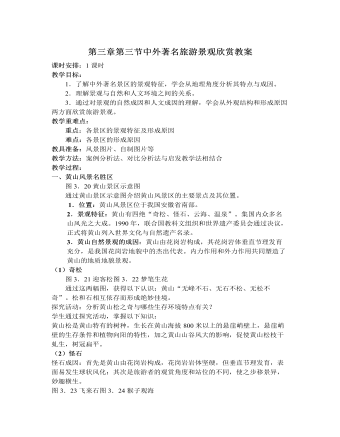
人教版高中地理选修3第三章第三节中外著名旅游景观欣赏教案
四、法国巴黎塞纳河畔的古城区城市建筑景观往往可以反映一个城市的发展过程,是城市历史的记录。巴黎的塞纳河沿岸景色优美,古老的塞纳河孕育了不可胜数的古迹,1991年巴黎的塞纳河沿岸作为文化遗产,被联合国教科文组织列入《世界遗产名录》。1.发展历史:2000年以前的巴黎只是塞纳河上西岱岛和附近几个小岛上的渔村,后来逐渐扩大,到3世纪开始有了巴黎这个名字。2.巴黎的建筑艺术和名胜古迹图3.35塞纳河风光通过图片,可以看出:塞纳河畔美丽的风景及城市的繁华。图3.36法国首都巴黎塞纳河畔的著名景点——凯旋门、艾菲尔铁塔夜景、卢浮宫外景、巴黎圣母院外景图文结合介绍巴黎塞纳河畔著名景点的位置及有关情况,重点掌握以下内容:①艾菲尔铁塔是巴黎的象征。卢浮宫原为宫殿群建筑,以收藏古典绘画和雕刻闻名。1793年改为国立美术博物馆。巴黎圣母院教堂为一典型的哥特式建筑。
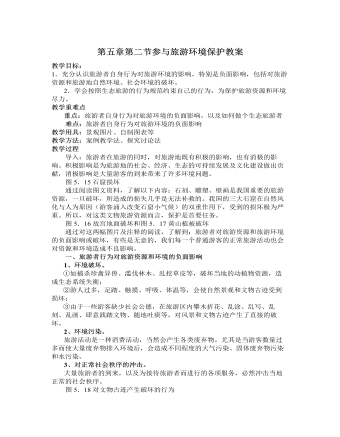
人教版高中地理选修3第五章第二节参与旅游环境保护教案
通过阅读,了解并掌握生态旅游的行为规范,这些行为规范不仅对保护旅游区的资源环境有利,而且为旅游者提供了个人如何更好地获得更大旅游收益的方法和途径。活动“除了脚印什么也不留下,除了照片什么也不带走。人类应该诗意地栖居在大地之上!”这是美国旅行者协会制定的生态旅游者十条道德准则之一,但作为普通游客也应该做到。结合本地实际,组织一次关于生态旅游的专题讨论会,讨论“诗意地栖居”的含义和意义。提示:可按一下步骤进行1.确定讨论会的准备时间(如一周)。2.将学生分成几组。每组确定一个选题,可自定题目,例如:(1)什么是生态旅游?(2)生态旅游为什么有利于保护环境?(3)学校附近有哪些旅游区适合开展生态旅游?(4)如果你去旅游,你会做些什么来保护环境?(5)介绍一个国内外著名的生态旅游区。3.各组分别收集资料,进行组内讨论,并撰写课题报告。4.各小组推选出一名同学向全班同学介绍各自的研究和看法。
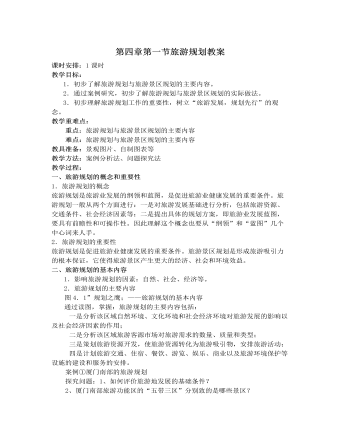
人教版高中地理选修3第四章第一节旅游规划教案
课下探究活动:收集有关广东仁化丹霞景区的资料,以图4.3为内容框架,分析广东仁化丹霞旅游风景区的规划。(活动目的:通过收集资料、综合分析,从而加深对知识的理解和记忆,培养学生的信息收集、分析能力以及合作意识。)6.景区开发应注意的问题旅游景区要实现可持续开发,应以科学的发展观为指导,统筹协调好各种关系。阅读旅游景区开发中的不和谐音通过阅读材料,了解以下问题:1.景区开发的不和谐音主要包括哪几方面?会带来哪些严重后果?2.如何避免景区开发的不和谐音?点拨:1.景区开发的不和谐音主要包括:品牌之争、重复开发现象严重、低水平开发屡见不鲜、不顾市场需求,盲目开发等,造成旅游资源的浪费、旅游环境的破坏,旅游景区的效益低。2.景区开发时应以科学发展观为指导,统筹旅游资源与旅游产品、旅游产品与旅游市场、旅游景区之间、旅游产品之间的关系,对景区进行合理的规划。

人教版高中地理选修3第一章第一节现代旅游教案
香港的旅游特色在“购”,而购物旅游又进一步促进了其他要素的发展。据统计,每年进入香港的国际旅游者中有60%左右的人是为了购物,其购物费用也占全部旅游费用支出的60%左右,使香港这个弹丸之地成为世界的“购物天堂”。思考:1.从旅游六要素的角度看,香港的“购”是如何促进旅游业发展的?点拨:到香港购物是许多游客来港旅游的主要动机。“购”是香港旅游六要素的核心,促进了整个旅游业的发展。2.香港的地理位置和自由港的地位,为旅游业的发展提供了哪些有利条件?点拨:香港是自由港,商品来自世界各地,由于大部分商品不收关税,香港的商品价格就相应较低。此外,这里每年都有许多换季大减价的促销活动,能为游客提供真正的实惠。香港店铺中销售着世界各地不同特色的货品,而且大部分服务行业的从业人员都受过专业训练,态度殷勤友善,以客为先。购物成为香港吸引游客的一个重要因素,为旅游的发展提供了极为有利的条件。

《十面埋伏》教案
教学过程 一、组织教学:(情景导入)播放《霸王别姬》这首歌,许多同学都非常喜欢这首歌曲,那么有谁知道它描写的是哪一历史事件。对,琵琶古曲《十面埋伏》描述的正是这一历史事件。公元202年“垓下大战”。这节课让我们一起来欣赏一首优秀的琵琶独奏曲《十面埋伏》。二、新课教学(一)简介乐器-——--琵琶A 琵琶是我国古老的乐器之一,半梨形音箱,面板为桐木,琴颈向后弯曲,钢丝尼龙弦,用人工指甲弹奏,空弦为Adea(6236)。B琵琶曲根据乐曲内容和风格分为文曲、武曲。文曲:节奏轻缓、抒情优美以描绘自然风光和内心情感见长。武曲:节奏复杂多变。情绪激烈雄壮富于戏剧性。
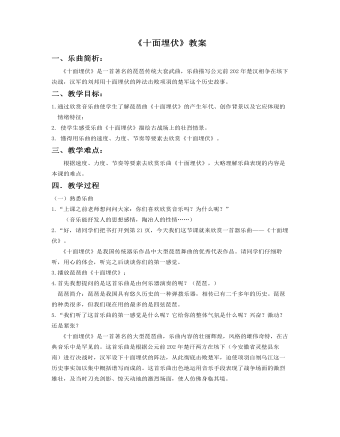
《十面埋伏》教案
“楚汉相争”:垓下决战是我国历史上一次有名的战役。秦朝末年,陈胜吴广揭竿而起。在风起云涌的农民起义猛烈打击下,秦王朝宣告灭亡。此时,刘邦的汉军和项羽的楚军展开了逐鹿中原、争霸天下的斗争。到公元前202年,楚汉双方已进行了长达数年的战争,由于西楚霸王项羽骄矜、优柔寡断而一再坐失良机,错过消灭刘邦汉军的机会,到该下决战时,刘邦以三十万的绝对优势兵力包围了十万之众。深夜,张良吹晓,兵士唱楚歌,使楚军感到走投无路,迫使在乌江展开一场格斗,项羽因寡不敌众而拔剑自刎,汉军取得了辉煌胜利。
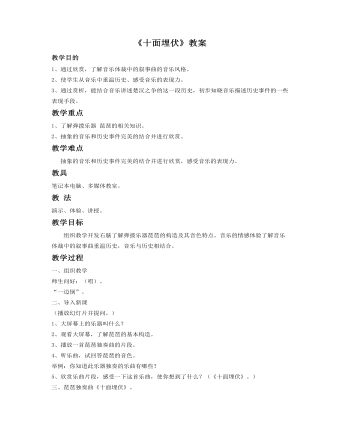
《十面埋伏》教案
教学过程一、组织教学师生问好:(唱)。“一边倒”。二、导入新课(播放幻灯片并提问。)1、大屏幕上的乐器叫什么? 2、观看大屏幕,了解琵琶的基本构造。3、播放一首琵琶独奏曲的片段。4、听乐曲,试回答琵琶的音色。举例:你知道此乐器独奏的乐曲有哪些?5、欣赏乐曲片段,感受一下这首乐曲,使你想到了什么?(《十面埋伏》。)三、琵琶独奏曲《十面埋伏》。1、叙事曲。2、讲述和十面埋伏相关的历史楚汉之争。3、乐曲取材。4、播放琵琶独奏曲《十面埋伏》。 (师)跟随音乐进行讲解,每一段音乐情绪的变化,描写场景的变化等。四、《十面埋伏》不仅是我国琵琶武曲中的精品,也是人类音乐文化的瑰宝。并被誉为我国十大名曲之一。中国十大名曲有哪十首?(试回答。)五、课堂小结:今天我们了解了琵琶的结构;音乐体裁叙事曲的风格;重温了历史楚汉之争;历史与音乐相结合,感受了音乐的表现力
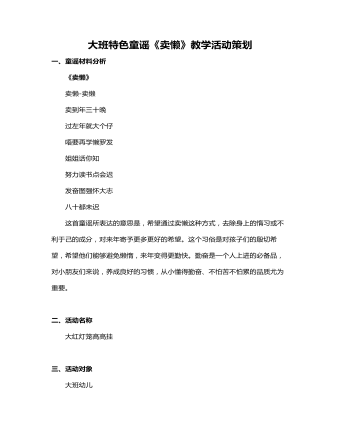
《卖懒》教学设计教案
1.制作红灯笼师:(展示漂亮的灯笼)小朋友们想不想自己亲手制作一个呢?生:好呀师:那小朋友们知道制作灯笼需要什么材料吗?生:彩纸、剪刀...师:没错,那老师先来展示一下怎么制作灯笼吧!(展示完后,开始让小朋友两两组合共同制作)2.制作灯笼剪纸师:小朋友们,刚刚是不是已经制作灯笼了呀?下面我们进行一个更好玩的环节?生:好呀好呀!师:那我先来展示一下咯,小朋友们别眨眼呀!(展示完后,开始让小朋友们独立完成)小结:通过制作共同合作制作灯笼与独自完成灯笼剪影,不仅使他们更能感知灯笼的形状,更能提高小朋友们的动手能力和思考力。

